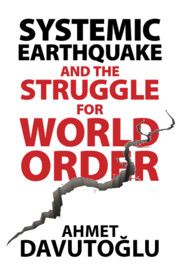Book contents
- Systemic Earthquake and the Struggle for World Order
- Systemic Earthquake and the Struggle for World Order
- Copyright page
- Dedication
- Contents
- Foreword
- Acknowledgments
- Abbreviations
- Introduction: Conceptual and Methodological Framework
- Part I Systemic Earthquake: Analysis and Consequences of World (Dis)Order
- Part II A New Vision: Inclusive Governance
- 5 Future Projections and Basic Principles of a New Order of Inclusive Governance: The Five I’s
- 6 Inclusive National Governance: From Survival to Sustainability
- 7 Inclusive Regional Governance: From Regional Cold Wars to Regional Orders
- 8 Inclusive Global Governance: A New Paradigm of Global Order
- Notes
- Bibliography
- Index
5 - Future Projections and Basic Principles of a New Order of Inclusive Governance: The Five I’s
from Part II - A New Vision: Inclusive Governance
Published online by Cambridge University Press: 09 January 2020
- Systemic Earthquake and the Struggle for World Order
- Systemic Earthquake and the Struggle for World Order
- Copyright page
- Dedication
- Contents
- Foreword
- Acknowledgments
- Abbreviations
- Introduction: Conceptual and Methodological Framework
- Part I Systemic Earthquake: Analysis and Consequences of World (Dis)Order
- Part II A New Vision: Inclusive Governance
- 5 Future Projections and Basic Principles of a New Order of Inclusive Governance: The Five I’s
- 6 Inclusive National Governance: From Survival to Sustainability
- 7 Inclusive Regional Governance: From Regional Cold Wars to Regional Orders
- 8 Inclusive Global Governance: A New Paradigm of Global Order
- Notes
- Bibliography
- Index
Summary
Looking at the general trend, we are walking towards the possibility of three different futures. The first possibility is a state of global chaos, the second possibility is a global autocracy and the third scenario is global democracy, could be the product of the motivational will of policy-makers, politicians, thinkers and opinion leaders with the backing of society, based on the centuries-long and bitter experiences of humankind and bestowed with the participatory virtues of shared values.
What we need to do is release ourselves from the psychology of pessimism, establish a healthy balance between a normativism attached to reality and a realism that takes values into account, and then to create a new projection of order within the harmony of this balance.
In order to elicit a new order’s doctrinal basis, one needs to define the fundamental principles that will constitute the intellectual substructure for international, regional and national-scale endeavors and guide practical applications.
In this framework in the fifth section, the principles of a vision for a new order are discussed and analyses the five principles of inclusive governance; inclusiveness, internal consistency, interest optimization, implementation of power structure and institutionalization.
Keywords
Information
- Type
- Chapter
- Information
- Systemic Earthquake and the Struggle for World OrderExclusive Populism versus Inclusive Democracy, pp. 131 - 148Publisher: Cambridge University PressPrint publication year: 2020
Accessibility standard: Unknown
Why this information is here
This section outlines the accessibility features of this content - including support for screen readers, full keyboard navigation and high-contrast display options. This may not be relevant for you.Accessibility Information
- 1
- Cited by
